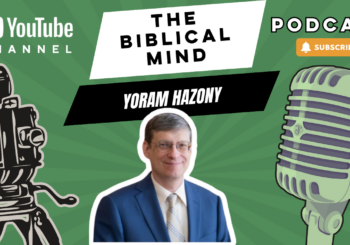‘God, I Need a Sign!’ What the Bible Says about Asking God for Signs
When I was a college student, I was obsessed with figuring out the God’s will for my life. Along with textbooks, I filled my bookshelf with titles like Elizabeth Elliot’s God’s Guidance: A Slow and Certain Light and Charles Stanley’s How to Listen to God. I was terrified that I would miss God’s path for me and sought it with all my heart.
Enjoying this article? Read more from The Biblical Mind.
I read in the Bible that people asked God for signs, and I was especially fond of how Gideon laid out a fleece (Judges 6:36-40). Two nights in a row, Gideon asked God for a sign. The first night, he basically said, “If you’re really going to do this, God, then make this wool fleece wet with dew and everything else dry.” God did. The second night was the opposite, “Make this fleece dry and everything else wet.” God did.
I followed suit metaphorically. “God if you really want me to resolve that conflict with my friend, have us meet at the drink station in the cafeteria at lunch today.” “Lord, if you want me to take this job, make this company offer and make the other one not offer.” And “God, if you really want me to marry him, make him always know what I want without me having to tell him.” God, I need a sign! Like so many today, I wanted signs to make sure I was getting the best life. Others use tarot cards, astrology, or crystals. I laid fleeces.
I didn’t know that my metaphorical fleece-laying wasn’t really like Gideon’s. I didn’t know that almost all biblical signs are for groups, not individuals. And I didn’t pay attention to the biblical stories where glimpsing the future made people less confident and feel less in control. Let’s look at the evidence so we can think biblically about our desire for signs.
God, I Need a Sign? My Fleece-Laying Wasn’t Like Gideon’s
The story of Gideon’s fleece is in Judges 6. Before Gideon laid a fleece, God had already spoken to him and shown that the voice was God’s by consuming meat and bread with fire from a rock.
Further, at God’s command, Gideon destroyed Baal’s altar with the Asherah pole and erected a new altar to God (at night because he was afraid). God also sent Gideon to save Israel from the Midianites and promised him success. Gideon summoned the army. He knew God’s will. It was then that he laid out his fleece.
Unlike Gideon, I didn’t already know God’s will when I laid my own metaphorical fleeces. And though Gideon eventually does conquer the Midianites with a tiny army, the fleece-laying seems more like an act of fear and mistrust than one of faith and trust in God. Gideon needed a sign because he did not believe what God promised, and the signs already given weren’t enough for him. God mercifully gives this sign and others, which do seem to spur Gideon to act.
The narrative simply tells Gideon’s story. It does not state, “As Gideon laid out a fleece, so also the people of God shall lay out fleeces for every decision and God will answer.” Besides testing God with the fleece (6:39), Gideon also launched an offensive to kill another nation, had many wives (Judges 8:31), and made Ishmaelite gold rings into an ephod (a high priest’s sleeveless garment) that the Israelites “prostituted themselves” to (Judges 8:27). We do not follow these other actions, so why the fleece? Just because I read that someone did some action in Scripture does not mean I’m supposed to do it too. Some biblical actions are clearly godly, like following commands. Others are less clear.
Signs Tend to Be for Groups, Not Individuals
When I said, “God, I need a sign,” it was only about my own life. I was more concerned about myself than my family, my church, my nation, or the world. Very few biblical examples exist of signs for individuals. God gave Hezekiah a sign of his personal healing (2 Kings 20:8–11), and Matthias was chosen by lots (below). Otherwise, signs were for groups of people, and usually about battles. Signs were acquired using objects like the ephod, Urim and Thummim, and lots.
The high priest had an ephod paired with a breastpiece and the Urim and Thummim, which were stones on the priest’s breastpiece. Together, these objects were specifically used for making decisions (Ex 28:15).1Page 10 of this pamphlet has a depiction of the high priest’s garments. The Bible neither physically describes the Urim and Thummim nor does it explain the process for their use. Were they used like lots or were they simply a symbol of authority? We only know that they were used for making decisions.
Though it’s possible that individuals inquired of God through the priest using these objects, the instances described in the Bible were for battle strategy (Num 27:21, 1 Sam 14:36-45, 1 Sam 28:6).2There are other instances in the Hebrew Bible of people inquiring of the Lord with a priest and neither the ephod nor the Urim and Thummim are mentioned. It is possible that they are used at these times. Other instances exist when they inquired of the Lord through a prophet; at those times it is unlikely that the ephod and Urim and Thummim are used. When David fled from Saul, Abiathar the priest brought him the ephod to ask God about battles. Neither the breastpiece nor the Urim and Thummim are mentioned, but God answered (1 Sam 23:1–13, 30:1–8).
Casting lots is mentioned more frequently than fleece-laying or making decisions using priestly attire (though some scholars think the Urim and the Thummim were used like lots). Casting lots is a bit like a Magic 8 Ball, but with fewer choices. When Jesus’ disciples wanted to replace Judas, they prayed and cast lots to choose between two candidates (Acts 1:26). They likely wrote the two names on stones and put them in a jar. Then they shook the jar until one fell out, based on which Matthias was understood to be God’s choice.3Clinton E. Arnold, Zondervan Illustrated Bible Background Commentary: Acts (Grand Rapids: Zondervan, 2002), 14. This is the final biblical example of casting lots.
Earlier examples showed they cast lots to determine allotments of land (Josh 18:8–10), order of the tribes (Judges 20:9), guilty parties (1 Sam14:41–434In this instance, casting lots is affiliated with the Urim and the Thummim., Jonah 1:7), and who got to keep Jesus’ clothes (Matt 27:35, Mark 15:24, Luke 23:24, John 19:24). Casting lots would be an easily accessible method for asking God’s help in making decisions, but there are no biblical references to it after Pentecost.
Gideon’s fleece, the ephod, the Urim and Thummim, and casting lots are all examples of objects and rituals used to learn hidden knowledge—what religion scholars often call “divination.” Except for choosing Matthias, these uses were not for predicting the future or making decisions for individuals’ lives. Even choosing Matthias is more about the continuation of the group than about the individual. Using objects to discern hidden knowledge is generally for groups of people, not individuals.
Signs Do Not Necessarily Inspire Confidence or Belief
I usually want a sign because I’m scared. I’m wondering about God’s ways and I want clarity and purpose. I think that if I have a sign, then I will be confident, courageous, and willing to move forward with strength. Human responses to signs of the future in the Bible, however, are mixed.
Gideon was empowered, but only after one sign that showed God was speaking and two other signs to confirm what God already said. If I’m like Gideon, one sign is not enough for me.
When God called Moses, Moses received two signs to prove this call was from God: the transformation of his staff into a snake and then back into a staff, and of his healthy hand into a leprous hand and then back into a healthy hand. (Ex 4:1–9). Moses replied to God’s call, “’Please send someone else” (Ex 4:13). Even with a lengthy conversation with God in addition to miraculous signs, Moses did not want to follow God’s call.
When Samuel anointed Saul as king, several signs confirmed Saul’s anointing and position (1 Sam 10:1–13). Later, Samuel called for a gathering of all the tribes and clans of Israel to figure out who would be king. Saul was chosen, but it was hard to find him because he was hiding among the supplies (1 Sam 10:22). Apparently, the signs did not give Saul confidence and courage in his new position.
The New Testament shows that overall, signs and prophets are historically resisted. Stephen accused the Sanhedrin of persecuting and killing the prophets; he pointed out that the leaders rejected the signs (Acts 7:1–53). Jesus agreed, saying, “Jerusalem, Jerusalem, you who kill the prophets and stone those sent to you, how often I have longed to gather your children together, as a hen gathers her chicks under her wings, and you were not willing” (Matt 23:37). When Jesus told his disciples that he would die and be resurrected, Peter rebuked him (Matt 16:21–23).
Many resist signs and prophets. Many are uncomfortable with hidden knowledge when it is revealed. Though I think that a sign would help me, I might join those who resist, hide, and ask God to send someone else.
So What?
So what does all this biblical analysis mean for us today? We do not have a high priest with the Urim and the Thummim; we do not cast lots. As for prophets, Continuationists believe they exist today but Cessationists say they are now unnecessary and no longer exist. Christians believe that our ability to discern God’s will is different because of the outpouring of Holy Spirit on Pentecost, after which there are no biblical examples of the use of objects to find hidden knowledge. This lack of examples, however, does not lead to a definite conclusion.
When people demand signs in the New Testament, Jesus seems clear that we should not ask for them (Matt 12:39, 16:4; Luke 11:29). So many signs have already been given, and Jesus either says he will give none (Mark 8:11–12), or will only give the sign of Jonah (Matt 12:39, Luke 11:29). Still, when his disciples ask for signs of Jesus’ coming and the end of the age, Jesus responds with the Eschatological Discourse which explains signs of his coming (Matt 24, Mark 13, Luke 21). Sometimes Jesus gives signs and at other times he rebukes the desire.
If we take a step back and consider the overall movement in Scripture, it seems to move away from the use of objects as signs. In the Hebrew Bible, asking for signs with the Urim and Thummim was a priestly act, part of the religion. God also seems generous with signs through casting lots and prophets. The New Testament, God is still generous with signs like miracles and miraculous spiritual gifts. These signs, however, are not about hidden knowledge, battles, or even personal future. The New Testament leans toward calling for belief in the signs already given. Jesus’ death and resurrection is a sign that echoes the sign of Jonah.
Still, we want to know the future and other hidden knowledge. We want to know it in the way that I did in college—to ensure that we’re following God. But we also want to know it so that we can save ourselves heartache (if we’re not going to marry that person or if that job is a dead end), or influence others. We want to know the future and other hidden things to give us some sense of control, confidence, or agency.
But would it really give us a sense of control, confidence, or agency? Maybe yes, maybe no. The Bible’s weight is on the negative side, as the signs and prophets are resisted by so many. And if we’re asking about ourselves more than about a group of people, it isn’t much like the biblical requests for signs.
Though agency and confidence are good, control seems to be the opposite of trust. True, trusting God is a journey, but I’m not advocating blind trust. I’m advocating trust in the God who has proven good in the past, the God who is full of mercy and grace and promises to be with us, the God who ultimately promises to save us and come again. We can have confidence that this God is with us, not in knowing exactly what God will lead us through. God does mercifully give signs in Scripture, sometimes when asked, and often when not asked. Perhaps it’s best to listen and look for those signs while we walk in trust.
End Notes
1. Page 10 of this pamphlet has a depiction of the high priest’s garments.
2. There are other instances in the Hebrew Bible of people inquiring of the Lord with a priest and neither the ephod nor the Urim and Thummim are mentioned. It is possible that they are used at these times. Other instances exist when they inquired of the Lord through a prophet; at those times it is unlikely that the ephod and Urim and Thummim are used.
3. Clinton E. Arnold, Zondervan Illustrated Bible Background Commentary: Acts (Grand Rapids: Zondervan, 2002), 14.
4. In this instance, casting lots is affiliated with the Urim and the Thummim.
Did you enjoy this article? Check out The Biblical Mind podcast.





